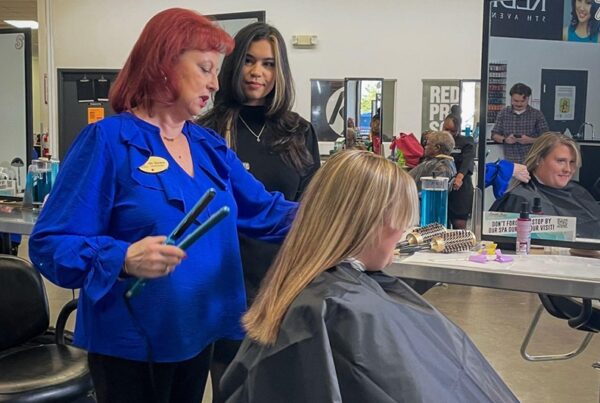
The South, a region steeped in tradition, has long been a hub for beauty and style. From the ornate hairstyles of the colonial era to the modern salons gracing every city street, the pursuit of beauty has undergone a remarkable transformation.
Yet, behind every perfectly styled coif and flawlessly applied makeup lies a hidden history – the evolution of cosmetology education.
In a place where appearances hold significant weight, the art and science of beauty have evolved far beyond simple vanity. It’s a tale of empowerment, skill, and the ever-changing standards of Southern style.
Today, we’ll delve into the captivating story of cosmetology education in the South, exploring how it has shaped not only the beauty industry but also the lives of countless individuals who have dedicated themselves to the pursuit of enhancing others’ natural allure.
The Early Days: Apprenticeships and Homegrown Skills
In the South’s early days, formal cosmetology education was non-existent. Aspiring beauticians learned their trade through apprenticeships, often under the tutelage of family members or established hairdressers.
This hands-on approach, while effective in passing down skills, lacked the structure and standardization that would later characterize the field.
These early hairdressers relied on a combination of homegrown remedies, natural ingredients, and rudimentary tools. They were often skilled in creating intricate hairstyles, particularly for the elite, using techniques passed down through generations.
However, their knowledge was largely confined to their immediate communities, limiting the spread of cosmetology techniques and innovation.
The Rise of Beauty Culture: The 20th Century Turning Point
The 20th century brought about significant changes in the beauty industry, both nationally and in the South. The rise of Hollywood and the advent of mass media glamorized beauty and made it more accessible to the masses.
This growing demand for beauty services created a need for more structured and standardized cosmetology education.
In response to this demand, beauty schools began to emerge across the South. These early institutions provided a more formal approach to cosmetology education, offering courses in hair styling, makeup application, and nail care. They also played a crucial role in professionalizing the beauty industry, setting standards for sanitation, hygiene, and ethical practices.
The Civil Rights Movement and the Beauty Industry
The Civil Rights Movement of the 1960s had a profound impact on the beauty industry, particularly in the South.
As African Americans gained greater access to education and employment opportunities, they also sought to establish themselves in the beauty sector. This led to the emergence of African American-owned beauty schools and salons, which catered to the unique needs and preferences of their communities.
These institutions played a crucial role in promoting diversity and inclusion in the beauty industry. They not only provided training and employment opportunities for African Americans but also celebrated their cultural heritage through hairstyles and beauty practices.
Modern Cosmetology Education: A Focus on Innovation and Technology
Today, cosmetology education in the South has come a long way from its humble beginnings.
Modern beauty schools, like Kenneth Shuler School of Cosmetology in Rock Hill, offer comprehensive programs that cover a wide range of topics, from hair styling techniques to professional skincare treatments. These programs are designed to equip students with the skills and knowledge they need to succeed in the ever-evolving beauty industry.
Technology has also played a significant role in transforming cosmetology education. Online learning platforms, virtual simulations, and social media have made it easier than ever for aspiring beauticians to access quality education and connect with industry professionals.
The Kenneth Shuler Approach: A Legacy of Excellence
Kenneth Shuler School of Cosmetology stands as a testament to the evolution of cosmetology education in the South. We have a rich history and a commitment to excellence.
Our cosmetology program, offered at all eight of our campuses, focuses on modern color techniques, Redken cutting systems, state board preparation, and ProsperU’s modern business training program.
Our fully licensed and trained instructors are dedicated to providing students with the best possible education and real-world experience at our student salons.
The Future of Cosmetology Education: Embracing Diversity and Inclusion
The future of cosmetology education in the South is brimming with potential, driven by a dynamic interplay of innovation, technology, and an unwavering commitment to diversity and inclusivity. As the beauty landscape continues to evolve, so too do the educational institutions that prepare the next generation of professionals.
Beauty schools across the region are actively reimagining their curricula to reflect the rich tapestry of cultures and styles that define the modern South. This means not only incorporating a broader spectrum of hairstyles, makeup techniques, and skincare practices but also fostering a deeper understanding of cultural nuances and sensitivities.
The goal is to create an educational environment that celebrates individuality and empowers students to cater to a diverse clientele with confidence and skill. By championing inclusivity, the beauty industry is not merely adapting to changing demographics; it’s actively shaping a more welcoming and equitable space where everyone feels seen, valued, and empowered to express their unique beauty.
Technology also plays an increasingly pivotal role in this evolution. From virtual simulations that allow students to hone their skills in a risk-free environment to online platforms that offer flexible learning options, technology is expanding access to education and creating new avenues for collaboration and innovation.
Conclusion: A Legacy of Beauty, Shaped by Education
The evolution of cosmetology education in the South is a testament to the enduring power of beauty and the dedication of those who have sought to master its art and science.
From the early days of apprenticeships and homegrown skills to the classrooms of Kenneth Shuler School of Cosmetology in Rock Hill, the journey has been one of transformation, innovation, and empowerment.
As we look to the future, it’s clear that cosmetology education will continue to play a vital role in shaping the beauty industry and the lives of those who choose to pursue a career in this dynamic field.
Whether you’re drawn to the creativity of hair styling, the precision of makeup application, or the therapeutic benefits of skincare, a career in cosmetology offers endless possibilities for personal and professional growth.
If you’re ready to embark on your own journey into the world of beauty, we invite you to learn more about our cosmetology school in Rock Hill!






